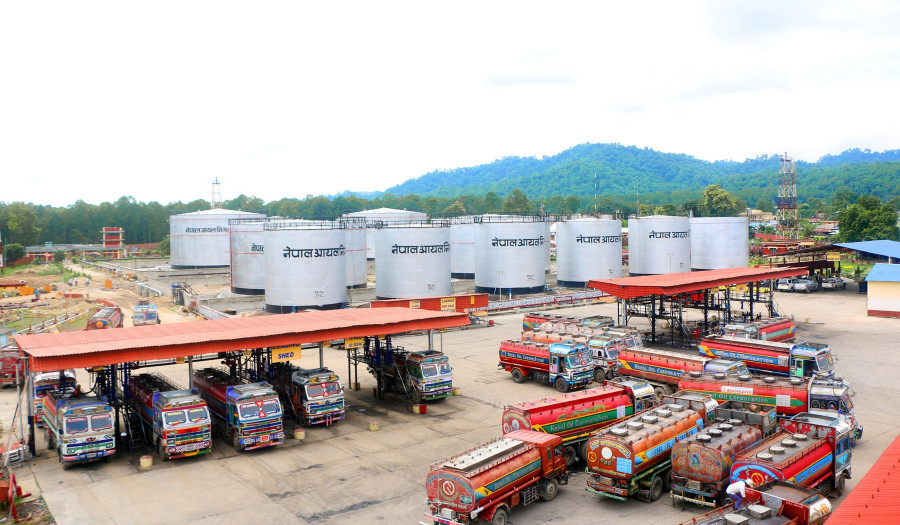Money
Petroleum dealers demand a bigger cut after price hike, threaten to disrupt supply
Fuel prices have increased but the commission has not, the Nepal Petroleum Dealers National Association says.
Krishana Prasain
While Nepalis are being pummelled by all-time high gasoline prices and soaring inflation, filling stations are seeing it as an opportune time to demand a bigger cut.
The Nepal Petroleum Dealers National Association has been bargaining for a raise in the commission, and multiple sources say that fuel sellers have stopped taking delivery in a bid to create a shortage in the market.
Lilendra Prasad Pradhan, president of the Nepal Petroleum Dealers National Association, told the Post that Nepal Oil Corporation hiked the price of petroleum products on Thursday, but it did not raise the sellers' commission accordingly.
The state-owned oil monopoly jacked up the price of petrol by Rs5 per litre to Rs150 per litre. Diesel and kerosene have become dearer by Rs5 per litre and costs Rs133 per litre each. This is the eighth time gasoline prices have been raised since July.
Pradhan said that the commission provided to retailers also increases with a hike in the price of petroleum products as per the agreement made with the dealers. But the government company has not increased their commission this time.
The dealers were expected to get a 3.12 percent increase in commission in petrol and a 3 percent increase in diesel with the new adjusted rate.
On Friday, petroleum dealers stopped buying gasoline from the oil depots as part of their protest.
Pradhan said that they have not made any decision to halt supply. “We are not allowed to shut down the petrol pumps. But with the corporation refusing to increase our commission, some petrol pumps have stopped sales,” he said.
The association on Friday held a press meet to announce a protest if the corporation did not hike their commission within 15 days.
Consumer rights activists say that like in past years, it’s a ploy of petroleum dealers and retailers to create a fuel shortage in the market to press their demand.
“Following a rise in prices of petroleum products, the commission given to dealers and retailers used to increase automatically. But a board meeting of the corporation on Thursday decided not to increase the commission,” said Sushil Bhattarai, deputy managing director of Nepal Oil Corporation.
“We have been providing the commission to dealers based on the price adjusted before this.”
The state-owned oil monopoly has declared itself bankrupt as global oil prices have shot up to new highs and it is still subsidising the fuel sold to Nepali consumers.
“The demand of petroleum dealers is not justifiable. The commission difference is just 12-15 paisa on a litre,” Bhattarai said.
The disagreement between petroleum dealers and the corporation is an indication that the market may sooner or later face shortages, consumer rights activists say.
According to international media reports, crude oil rose above $114 a barrel on Friday in a volatile session as fears over disruption to Russian oil exports in the face of Western sanctions offset the prospect of more Iranian supplies in the event of a nuclear deal with Tehran.
“As we are going to receive a new price list in mid-March from Indian Oil Corporation, the price of petrol may increase by Rs10 per litre. “In a worst case scenario, we have to pass on the extra cost to consumers,” Bhattarai said.
“We have been adjusting the price hike to control inflation as it may negatively affect the economy,” Bhattarai said. “But if the price keeps rising, we don’t have any other alternative.”
The corporation said it was using Rs4.30 billion from the price stabilisation fund to finance petroleum imports. The next instalment payment has to be sent to its sole supplier Indian Oil Corporation on March 8.
"The corporation is planning to borrow money from banks and financial institutions to buy petroleum products," Bhattarai said. “We have also written to some financial institutions for a loan.”
The corporation said it was incurring losses amounting to Rs2.50 billion fortnightly even with the latest price hike on Thursday. It has lost Rs25 billion since the start of the fiscal year.
“Besides deciding not to increase the commission of fuel dealers, the corporation has also cut the allowances it used to give to its permanent staff to buy clothes,” officials said.




 14.24°C Kathmandu
14.24°C Kathmandu















